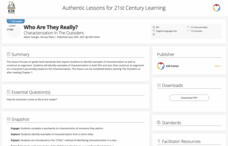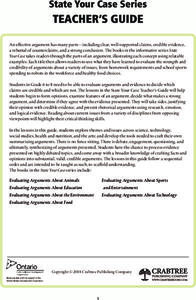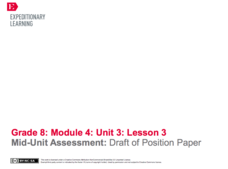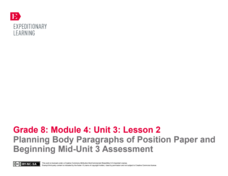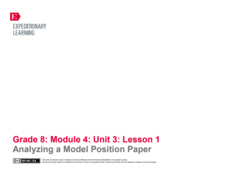Curated OER
Hic-Hic-Hooray!
What is really the best way to get rid of hiccups? Investigate some old wives' tales and folk remedies related to health. Middle schoolers explore the science behind why people might believe these myths to be true and find the real...
Curated OER
Expressing Your Views to the Letter
Analyze the motivation, purpose, and value of letters to the editor by examining letters written in response to the violence at Columbine High School. For homework, middle and high schoolers write their own letters to the editor about an...
Curated OER
Campaign Trailblazers
Explore the backgrounds, qualifications, and platforms of the presidential candidates for the 2000 election. Though the lesson is outdated, the activities within the informational text could be good practice for your young learners as...
Curated OER
Redistricting: Drawing the Lines
Difficult redistricting concepts are covered in a context that will make it understandable to your government scholars. They begin with a KWL on the term redistricting and then watch a video to answer some questions. They analyze...
Curated OER
The Internet of Things: IoT
How has the Internet of Things affected our lives? Scholars examine the massive influence of mobile devices in this analysis lesson, which begins with a seven-minute documentary clip. They also read a New York Times article (linked)...
K20 LEARN
It’s All Greek to Me: Greek and Latin Roots
Ancient Greeks and Romans have contributed far more to modern culture than mythic heroes and stunning architecture. Greek and Latin roots are the foundation of many English words. Middle schoolers engage in an activity that asks them to...
K20 LEARN
Multimodal Narrative Writing: Thumbprint Autobiography
Thumbprints, like people, are unique. Middle schoolers watch videos that explain how fingerprints are created and why they are unique. Learners then respond to guiding questions about themselves and use these details to create their...
Global Oneness Project
The Importance of Indigenous Language Revitalization
Middle schoolers consider languages as representations of cultures and the importance of preserving various languages, especially the rapidly disappearing languages of indigenous peoples, in a lesson that tells the story of Marie Wilcox...
Curated OER
Putting it Together: Analyzing and Producing Persuasive Text
Young orators demonstrate what they have learned about persuasion and persuasive devices throughout the unit by analyzing a persuasive speech and then crafting their persuasive essays. Class members engage in a role-play exercise, use...
Curated OER
"The Story of an Hour" Lesson 5: Teacher's Guide and Notes
Learning how to craft a compelling argument supported by evidence and logical reasoning is an essential skill. The fifth lesson in "The Story of An Hour" unit asks young scholars to formulate an argument in response to the question, 'Is...
Curated OER
How Will We Create a Future without Waste?
Many young people act globally by reducing, reusing, and recycling, Now they take it to the next level by upcycling. Middle schoolers design a proposal to eliminate waste by exploring the new material cycle and applying their knowledge...
K20 LEARN
Writing An Argumentative Paragraph: Argumentative Writing
Learning how to craft a cogent argument based on a solid claim, supported with evidence and solid reasoning, is an important life skill. Teach middle schoolers about argumentative writing with a lesson asking them to analyze the claims,...
K20 LEARN
Who Are They Really?: Characterization In The Outsiders
Ponyboy, Johnny, Winston, and Darry come alive in a lesson that focuses on the details S. E. Hinton uses to characterize the Greasers and the Socials. The class first observes the actors' words; the thoughts revealed their effect on...
K20 LEARN
A Way With Words: Copy Editing And The Writing Process
Learning to edit copy using correct grammar and mechanics is an essential skill in school—where scholars are called upon to edit their peers' writing—and in business. Class members practice this skill by first editing a provided article...
Angel Island Immigration Station Foundation
Culminating Writing Project - Reporting on Angel Island
The unit study of Angel Island Immigration Station concludes with scholars using information from the previous lessons to craft a news story about the Angel Island program.
Crabtree Publishing
State Your Case Series
Four lessons make up a unit focused on writing persuasive essays. Each unit builds on the last, ultimately taking pupils through the writing process. Scholars make a claim, create an argument, debate both sides, then state their opinion....
Thoughtful Learning
Using Perspective Shifting to Persuade Readers
One of the key competencies of social and emotional learning is social awareness and being able to see things from another's perspective. This ability to shift perspective is particularly important when crafting an argument to persuade...
EngageNY
End of Unit Assessment: Final Position Paper
All good essays must come to an end. Pupils write the final drafts of their position papers about the best food chain from Michael Pollan's The Omnivore's Dilemma. Next, they share their favorite part of their papers with their partners.
EngageNY
Mid-Unit Assessment: Draft of Position Paper
What is the purpose of an introduction and conclusion? Using the resource, scholars review the model position paper from activity one and discuss the author's choices. Next, they draft their position papers' introductory and concluding...
EngageNY
Planning Body Paragraphs of Position Paper and Beginning Mid-Unit 3 Assessment
The best sandwiches aren't always edible. Pupils use a Quote Sandwich graphic organizer to plan paragraphs two and three of their position papers about the best food chain. Next, they begin drafting their body paragraphs for the mid-unit...
EngageNY
Analyzing a Model Position Paper
What's the difference between a position speech and a position paper? Scholars use a rubric to analyze a model essay about Michael Pollan's food chains to understand what makes them unique. Additionally, pupils create anchor charts...
EngageNY
End of Unit 3 Assessment: On-Demand Writing— Photograph and Song Choices for a Film
Ready, set, write! Every great film begins with a script, and every presentation starts with a plan. Directors use their research and experience to compose an essay explaining the rationale behind their film's musical and visual choices...
EngageNY
Writing an Argument Essay: Planning the Essay
Pupils use a helpful resource to begin a Writing Improvement Tracker, developing awareness of their writing strengths and challenges. Additionally, they continue planning their argument essays about Shakespeare's A Midsummer Night's...
EngageNY
Writing an Argument Essay: Planning the Essay
It's time for a quote sandwich! Using the resource, pupils learn about the three parts of an effective quotation: introduction, quote, and analysis. Scholars use the model to peer critique each others' writing to show what they learned.














